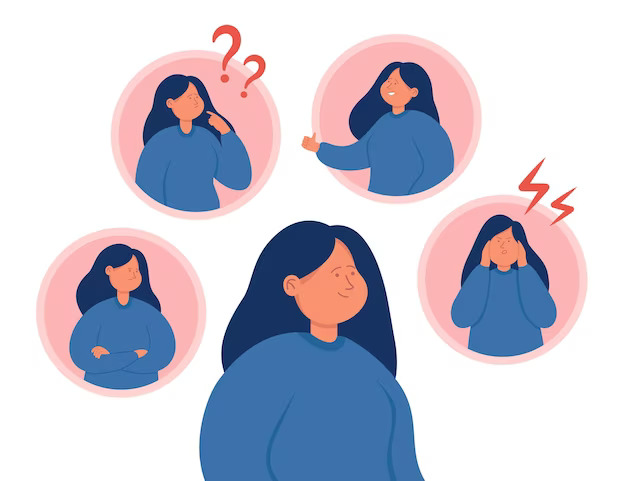Dr. Soumiya Mudgal2023-02-23T12:56:33+00:00
A mood disorder is a mental health condition characterized by persistent disturbances in an individual’s mood or emotional state. Mood disorders can be caused by a variety of factors, including genetic predisposition, life events, and imbalances in brain chemistry. According to the Best Psychiatrist Doctor in Delhi, treatment for mood disorders often involves a combination of medication and psychotherapy, such as cognitive-behavioral therapy (CBT) or interpersonal therapy (IPT), to help manage symptoms and improve quality of life.
The most common types of mood disorders are:
- Major Depressive Disorder: A mood disorder characterized by feelings of sadness, hopelessness, and a loss of interest in activities that were once enjoyable.
- Bipolar Disorder: A mood disorder that causes extreme mood swings, with periods of mania or hypomania (elevated or irritable mood) alternating with episodes of depression.
- Persistent Depressive Disorder: A mood disorder characterized by chronic feelings of sadness and low mood that last for two years or longer.
- Seasonal Affective Disorder: A mood disorder that typically occurs in the fall and winter months, with symptoms of depression related to changes in daylight.
- Mood Disorder Due to a General Medical Condition: A mood disorder that is caused by an underlying medical condition, such as thyroid disease or Parkinson’s disease.
Mood Disorder Causes
The exact causes of mood disorders are not fully understood, but research suggests that a combination of genetic, environmental, and psychological factors may play a role. Here are some potential causes of mood disorders:
- Genetics: Mood disorders tend to run in families, and research suggests that certain genetic variations may increase an individual’s risk of developing a mood disorder.
- Brain chemistry: Mood disorders are often associated with imbalances in brain chemicals, such as serotonin, dopamine, and norepinephrine, which can affect mood regulation.
- Life events: Traumatic events, such as abuse, neglect, or loss of a loved one, can trigger or worsen mood disorder symptoms.
- Environmental factors: Exposure to chronic stressors, such as poverty, unemployment, or discrimination, may increase an individual’s risk of developing a mood disorder.
- Medical conditions: Certain medical conditions, such as thyroid disorders or chronic pain, may increase an individual’s risk of developing a mood disorder.
- Substance use: Substance use, particularly alcohol and drug use, can trigger or worsen mood disorder symptoms.
It is important to note that while these factors may increase an individual’s risk of developing a mood disorder, they do not necessarily cause the disorder. Mood disorders are complex conditions, and the causes may vary from person to person.
Mood Disorder Symptoms
Mood disorders are a group of mental health conditions that affect a person’s mood, emotions, and behavior. Symptoms can vary depending on the type of mood disorder, but here are some common symptoms:
- Persistent feelings of sadness or hopelessness
- Loss of interest in activities that were once enjoyable
- Changes in appetite or weight
- Sleep disturbances, such as insomnia or oversleeping
- Decreased energy or fatigue
- Difficulty concentrating or making decisions
- Feelings of worthlessness or guilt
- Thoughts of suicide or self-harm
- Irritability or agitation
- Rapidly changing moods or emotions
- Impulsivity or risk-taking behavior
- Hallucinations or delusions (in severe cases of bipolar disorder or major depression with psychotic features).
It is important to note that experiencing some of these symptoms does not necessarily mean that an individual has a mood disorder. However, if these symptoms persist for an extended period of time and interfere with daily life, it is recommended to seek professional help from a mental health provider. A proper diagnosis and treatment plan can help manage symptoms and improve quality of life.
Choose Psychiatrist Doctor Soumiya Mudgal for Mood Disorder Treatment
There are several reasons why a person with a mood disorder may choose to seek treatment from a psychiatrist. Here are some of the benefits of working with a psychiatrist:
- Specialized training: Psychiatrists are medical doctors who have completed specialized training in mental health and are experts in diagnosing and treating mood disorders. Dr. Soumiya Mudgal provides is the best psychiatrist in Delhi for mood disorder treatment and has a deep understanding of the underlying biological and psychological factors that contribute to mood disorders and is trained to use a variety of treatment modalities to manage symptoms.
- Medication management: Psychiatrists are licensed to prescribe medication, which can be an important part of managing mood disorders. They can work with patients to find the right medication and dosage to manage symptoms and minimize side effects.
- Comprehensive treatment: Psychiatrists can provide comprehensive treatment that includes medication management, therapy, and other interventions to address the complex nature of mood disorders. They can also help patients manage any co-occurring mental health conditions or medical issues that may be contributing to their mood disorder.
- Ongoing care: Mood disorders are chronic conditions that require ongoing care and management. Psychiatrists can work with patients to develop a treatment plan that meets their specific needs and can provide ongoing care and support to ensure that the patient continues to make progress.
- Collaboration with other providers: Psychiatrists often work in collaboration with other healthcare providers, such as therapists, primary care physicians, and other specialists, to provide comprehensive care for patients with mood disorders.
Overall, working with a psychiatrist can provide patients with a range of treatment options and ongoing care and support to manage their mood disorders and improve their quality of life.
Treatment You May Also Like:
> Schizophrenia Treatment in Delhi
> Depression Treatment in Delhi
> Mood Disorder Treatment in Delhi
Clinic Locations:
> Psychiatrist Doctor in Safdarjung

